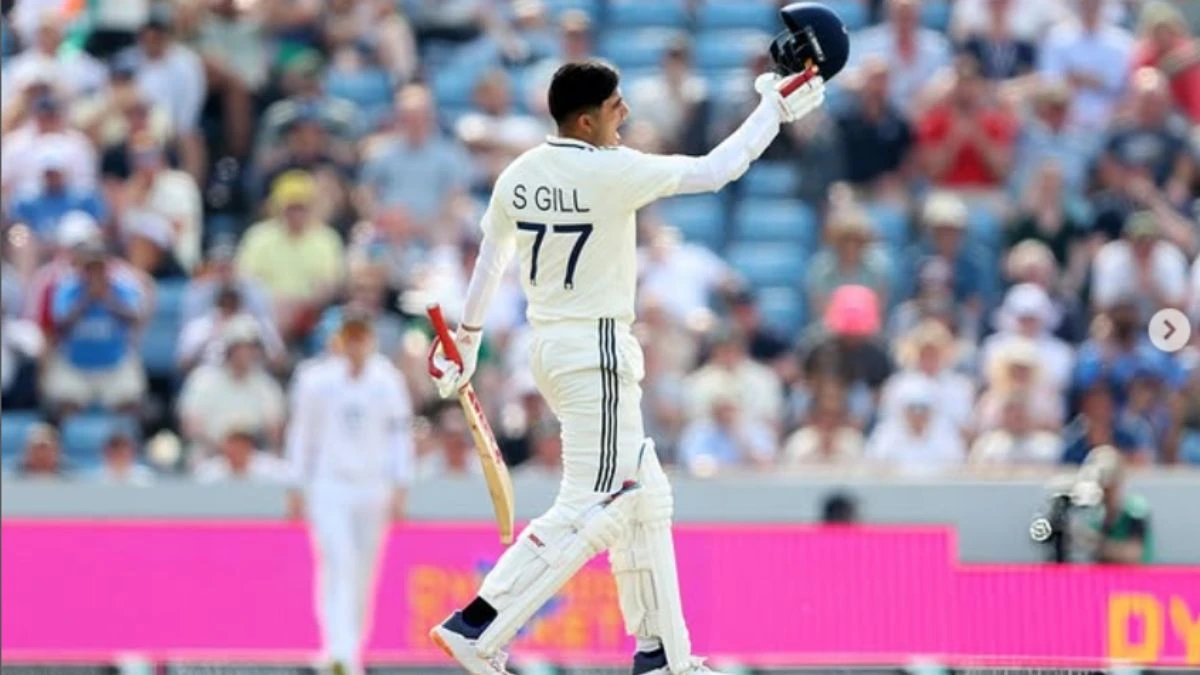The Prince of Indian Cricket Rewrites History Books
In what can only be described as a captain's knock of the highest caliber, Shubman Gill has etched his name into cricket folklore with his maiden 150+ score in Test cricket.
On a sun-drenched day at Edgbaston, Birmingham, the 25-year-old skipper not only silenced his critics but also rewrote several record books, cementing his status as India's new batting sensation.
Breaking the 23-Year Drought
Gill's magnificent innings of 165+ runs represents more than just personal glory—it marks the first time in 23 years that an Indian batsman has crossed the 150-run mark on English soil.
The last Indian to achieve this feat was the legendary Rahul Dravid, who scored a magnificent 217 at The Oval in 2002.
For over two decades, this milestone had remained elusive for Indian batsmen in England, making Gill's achievement all the more remarkable.
Historic Captaincy Records
As captain, Gill has achieved something truly extraordinary. His score is now the highest by an Indian captain in England, surpassing Mohammad Azharuddin's long-standing record of 179 runs scored at Old Trafford in 1990.
This achievement places Gill in an exclusive club, making him only the second Indian captain to score 150+ runs in a Test match on English soil.
The Punjab batsman has also become the first Indian captain in 35 years to score consecutive centuries in England, following his impressive 147 at Headingley in the first Test.
This rare feat was last accomplished by Azharuddin in 1990, when he scored tons at Lord's and Old Trafford.
A Captain's Burden Transformed into Glory
When Gill walked to the crease at 161 for 3 after Karun Nair's dismissal, India was in a precarious position.
The weight of captaincy, combined with his relatively modest overseas average of 25.7 in SENA countries, had placed enormous pressure on the young skipper. However, what followed was a masterclass in captaincy under pressure.
Displaying remarkable composure and technique, Gill batted for 263 deliveries to reach his 150, showcasing a perfect blend of aggression and restraint.
His innings was characterized by crisp strokes spread across the field—11 boundaries to reach his century milestone, with shots flowing through cover as frequently as between backward square-leg and midwicket.
Why Gill’s Knock is Special?
First Indian captain in 46 years to score 150+ in England.
Youngest Indian captain to achieve this milestone at age 25.
Most controlled century on record in England (false shot %: 3.5 vs avg. 12).
Back-to-back centuries in the current series, joining legends like Don Bradman and Gary Sobers as visiting captains with tons in each of the first two Tests in England.
Third Indian captain to score 150+ in a Test before turning 26, after Mansoor Ali Khan Pataudi and Sachin Tendulkar.
First Indian batter in 23 years to score 150+ in England since Rahul Dravid’s 217 at The Oval
Social Media Reactions
Gill’s Journey: From Prodigy to Captain
Gill, dubbed the “Prince of Indian Cricket,” was handed the Test captaincy at a time of transition, following the retirements of Rohit Sharma and Virat Kohli. Despite initial doubts about his overseas record, Gill responded with runs and leadership, becoming the fifth youngest Indian Test captain and the fifth to score a century on captaincy debut.
His approach as captain emphasizes clarity, communication, and player security—a leadership style inspired by his predecessors but uniquely his own.
A Partnership That Defined the Innings
Gill's record-breaking knock was beautifully complemented by his partnership with Ravindra Jadeja. The duo added 203 runs for the sixth wicket, with their overnight partnership of 99 runs setting the foundation for India's commanding total of over 400.
Jadeja's contribution of 89 runs provided the perfect foil to Gill's aggressive approach, allowing the captain to play with freedom and express his natural game.
From Criticism to Celebration
This innings represents a remarkable turnaround for Gill, who had faced criticism for his overseas record. With just two half-centuries in SENA countries before this series, questions were raised about his ability to lead India's batting in challenging conditions.
His response has been emphatic—two centuries in as many Tests, averaging 50 in England, and over 400 runs on English soil.
Statistical Comparison: Indian Captains’ 150+ Test Scores Overseas
| Player | Country | Score | Year |
|---|---|---|---|
| Mohammad Azharuddin | England | 179 | 1990 |
| Shubman Gill | England | 150+ | 2025 |
| Virat Kohli | England | 149 | 2018 |
| Sunil Gavaskar | West Indies | 205 | 1971 |
| Sourav Ganguly | England | 128 | 2002 |
FAQ
Question 1. Who holds the record for the highest score by an Indian captain in England?
Answer: Mohammad Azharuddin holds the record with 179 at Manchester in 1990.
Question 2. How significant is Shubman Gill’s 150+ score in England?
Answer: Gill is only the second Indian captain to score 150+ in England, ending a 46-year drought and joining a rare club of Indian skippers with such a feat.
Question 3. What makes Gill’s Edgbaston century unique?
Answer: Gill’s century is statistically the most controlled on record in England, with a false shot percentage of just 3.5%—better than legends like Cook, Root, and Dravid.
Question 4. How did social media react to Gill’s milestone?
Answer: Fans and cricket experts celebrated Gill’s achievement, hailing him as the new leader of Indian cricket and praising his composure and leadership.
Question 5. How old is Shubman Gill, and what other records has he set?
Answer: Gill is 25 years old. He is the youngest Indian captain to score 150+ in England and has scored centuries in both his first two Tests as captain, a rare feat among visiting skippers
Disclaimer:
The information provided regarding Shubman Gill's remarkable performance in England is based on public records, reports, and match statistics as of 2025. While every effort has been made to ensure accuracy, specific match details and player statistics may vary with future updates or additional achievements. This content is intended for informational and entertainment purposes only. For the most up-to-date details, please refer to official cricket boards, match reports, or recognized sports media outlets.






